You were loading cargo at the Port of Gulfport when an accident left you with a serious back injury. Or maybe you were repairing a ship when faulty equipment gave way. Now you’re facing medical bills, lost time at work, and questions about what comes next.
If your job involves the waterfront, shipyards, or marine terminals, you may be protected by a federal law called the Longshore and Harbor Workers’ Compensation Act (LHWCA). This program offers benefits to injured maritime workers — but only if you meet certain qualifications.
At Ben Bowden, PC Trial Lawyer, we help Gulfport workers understand their rights under the LHWCA and fight for the benefits they’re owed. This guide breaks down who qualifies, what’s covered, and how to take the next step after a longshore accident.
What Is the LHWCA?
The Longshore and Harbor Workers' Compensation Act is a federal workers’ compensation program that applies to maritime workers who are injured while working on or near navigable waters. This includes docks, shipyards, wharves, piers, and other adjoining areas. The LHWCA is different from traditional workers’ comp programs because it’s specifically designed for employees whose jobs are tied to maritime activity but who don’t qualify as seamen.
If your injury happened while loading, unloading, repairing, or building a vessel, and you were working in the Gulfport port area or surrounding terminals, you may be covered.
Who Is Covered Under the LHWCA?
The LHWCA generally covers:
- Longshoremen and dock workers
- Shipbuilders and ship repairers
- Harbor construction workers
- Marine terminal workers
It does not typically apply to crew members of vessels or people with office-only roles. However, many Gulfport-area workers who are near vessels or part of waterfront operations may still qualify.
One key point: You do not have to prove that someone else was at fault for your injury. The LHWCA offers protection regardless of how the accident happened, as long as it occurred during the course of your employment.
What Benefits Can You Receive?
If you qualify under the LHWCA, you may be entitled to:
- Medical treatment for your injury or illness
- Temporary or permanent disability benefits for lost wages
- Vocational rehabilitation services if you cannot return to your previous job
- Survivor benefits for families of workers who pass away due to work-related accidents
Every case is different. That’s why it helps to have a Gulfport longshore accident attorney who can evaluate your claim and make sure you are getting the full benefits allowed under the law.
Why You Should Talk to a Longshore Accident Attorney
LHWCA claims can involve strict deadlines, federal filing rules, and disputes with insurance carriers. Trying to manage all of that while recovering from an injury can be overwhelming. An experienced attorney who understands maritime law can step in to:
- Confirm your eligibility
- Help you file the right paperwork
- Handle appeals if your claim is denied
- Represent you in hearings if needed
Ben Bowden has worked with many longshore workers across Gulfport and knows how to deal with these cases from start to finish.
Get Help After a Longshore Accident in Gulfport
You don’t have to go through this process alone. If you’ve been hurt while working in a maritime job in or around Gulfport, you may be entitled to benefits under the LHWCA. We’re here to make sure you understand your rights and take the right steps forward.
Contact Ben Bowden, PC Trial Lawyer, today for a free consultation. Let us help you secure the benefits you deserve and move forward with confidence.




.png)
.png)

.jpg)